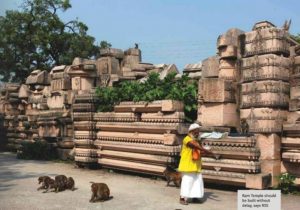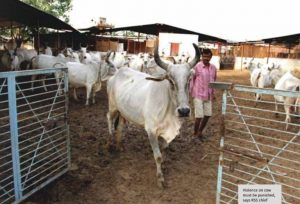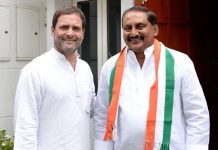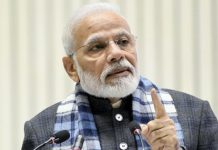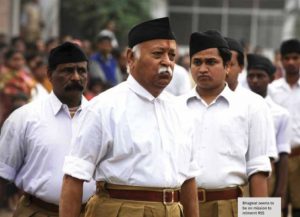 Earlier perceived to be the rightwing ideology outfit, the Rashtriya Swamaysewak Sangh (RSS) is seriously trying to dispel the notion that it is anti-minorities. This is the impression one could gather after the three day long conclave “Future of Bharat:An RSS Perspective”. The observations by RSS chief Mohan Bhagwat that all religions are equal and a clear message to cow vigilantism that “there should be no violence in the name of cow” clearly indicate that RSS is now pushing for inclusivity and Hindutva for all.
Earlier perceived to be the rightwing ideology outfit, the Rashtriya Swamaysewak Sangh (RSS) is seriously trying to dispel the notion that it is anti-minorities. This is the impression one could gather after the three day long conclave “Future of Bharat:An RSS Perspective”. The observations by RSS chief Mohan Bhagwat that all religions are equal and a clear message to cow vigilantism that “there should be no violence in the name of cow” clearly indicate that RSS is now pushing for inclusivity and Hindutva for all.
At the outset, Bhagwat said, “Listen to me, though you may disagree with me. We don’t force anyone to follow RSS ideology, nor do we want to convince anyone”. The RSS is being still grossly misunderstood. His observation that the Congress party gave to the country great leaders and its role during Independence came as a surprise. From the statement one can infer that RSS chief does not advocate the theory of “Congress-mukt Bharat”.
Bhagwat’s assertion that Hindu Rashtra “does not mean there is no place for Muslims” and that Hindutva would cease to exist if “Muslims are unwanted” may prove to be a turning point for RSS and its vision for a Hindu Rashtra. Opposition parties like the CPI(M), meanwhile, claimed that Bhagwat was “merely reiterating RSS’s long-held position that asserts India to be a Hindu Rastra and not a secular nation as stated by the Constitution and envisioned by our freedom movement.”
Bhagwat has signalled RSS’s acceptance of the Indian Constitution including secularism. He made it clear that Hindutva means kutumb or a family and it would include all living beings in this country. The conclave ahead of the 2019 general election makes an attempt to convey the message of ‘the world as one family’. The way forward could be repositioning the RSS ideology to more modern 21st century and to carve out a distinct identity.
Firm on Ram Temple
Bhagwat made a categorical statement that Ram temple should be built at the Ram Janmabhoomi in Ayodhya at earliest. He said that if this happens, discrimination with Muslims will be reduced. Describing Lord Ram as Imam-e-Hind, Bhagwat said he may not be a God for some people of the country, but he is an idol of Indian values for people from all sections of the society. “As a Sangh worker, head of the sangh and as a part of Ram janambhoomi andaloan, I want that a grand Ram temple should be constructed at the earliest at the birth place (Ayodhya) of Lord Ram,” he said.
“It should have happened by now. The construction of a grand Ram temple will help in ending a major reason for tension between Hindus and Muslims, and if the temple is built in a harmonious way, then there will be no more pointing of fingers at Muslims,” he said on the final day of the RSS’s three-day lectures series.
This is matter to “strengthen unity” and culture of the country, it is an issue of faith for crores of people of the country, he said while supporting a dialogue on the issue but said the final decision is with Ram Mandir Samiti which is spearheading the movement for construction of a temple. A Supreme Court verdict is expected to come soon before the current Chief Justice of India Dipak Misra demits office on October 2. Bhagwat said that it is prerogative of the government whether to bring an ordinance on the construction of Ram temple.
Article 370 and 35A
He presented Sangh’s views on a number of contentious issues without mincing words. According to him, the RSS does not accept Article 370 and 35A of the Constitution related to Jammu and Kashmir. While Article 370 deals with autonomy of the State, Article 35-A allows the State Assembly to define permanent residents of the state. However, Bhagwat pitched for greater development of the State, saying it was essential to bring its people into the mainstream.
On the issue of common civil code, Bhagwat said that the society has many groups and it should be kept in mind while implementing the code. “When it is discussed, it is framed as a Hindu-Muslim issue. But it is not limited to that. (A uniform code) will alter practices of everyone, including of Hindus. Tribals have their own laws. Keeping in mind this diversity, the Constitution allows this…Keeping all these factors, there should be efforts towards a consensus in society for any code…but in its implementation, there cannot be different groups in society,” he added.
Bhagwat reiterated that Indians are Hindus by identity and Hindutva is all about unity and inclusion. “The RSS is trying to unite all Hindus and Hindutva is the balance between all religions,” he said. “No one is an outsider in India. Hindutva is different from Hinduism. Hindutva is about unity of all who live in India,” Bhagwat said, adding that the world is accepting Hindutva more and more these days. However, in India, there is aggression towards Hindutva because of a lack of understanding of what Hindutva stands for.
Cow vigilantism
At the end of the conclave, Bhagwat replied to most questions and tried to dispel several myths about the RSS like its views on cow vigilantism. He said that violence cannot be tolerated and there should be strict action against any such acts. “Taking law into one’s own hands is a crime and such criminals should be punished but there should be protection for cows,” the RSS chief added. Bhagwat, however, said that ‘Gau raksha’ can also be done in a constitutional way by keeping cows first. Bhagwat also highlighted that many Muslims in the country run cow shelters. This came as a direct contradiction to the recent remarks by RSS leader Indresh Kumar who had said earlier that “Mob lynching can’t be welcomed…if the practice of eating cow meat is stopped, many such crimes of the ‘Satan’ could be stopped.”
Speaking on communal politics, Bhagwat apparently not only targeted the Congress but also BJP’s top leadership of Modi and Shah. “The politics of shamshaan, qabristan, bhagwa aatankwad is done by those whose only aim is to be in power. They need to re-think this,” he said.
Earlier during the event, Bhagwat had clarified that the RSS never asks it volunteers to work for a political party. The 93-year-old organisation does not give advice, but offers suggestion if it is sought, the RSS chief said, without naming the Bharatiya Janata Party (BJP) or any of its leaders.
“We speak about interests of the nation and if we have strength, then we push for what we consider to be right. There is nothing to hide here. We do it openly,” he said. “We never ask a volunteer to work for a political party. But we do say that they should back those who are working for the nation and have a dream for the nation. Anyone (political party) can have such a policy. It is not that only one has it and another cannot have so.”
Advising political parties
Without naming the BJP, which is ideologically affiliated to the RSS, Bhagwat said his organisation is often asked about its political ambitions, why so many of its people are in one party and what is its association with politics. “It is asked why so many of them (RSS workers) are one party. This is not our concern. Why they do not wish to be associated with other parties is for them to consider. We never ask a swayamsewak to work for a particular political party,” he said. The opposition has often accused the RSS of actively interfering in politics through the BJP, with Congress president Rahul Gandhi alleging that the organisation seeks to capture institutions with help from the Modi government.
In the BJP, which Mr Bhagwat did not refer to directly, he said many leaders are older and senior to him and have more experience in politics than he has in the RSS. “If they need advice and seek it, then we give them,” he said, adding that the RSS wants the BJP to work autonomously. “The centre of power will remain as has been decided by the Constitution,” he clarified, adding that his organisation considers it wrong if it is dictated from the outside.
“The Sangh is wedded to national interest, and is does not believe in nursing enmity with one or having special friendship with another,” he claimed. “It works for man-making but what its volunteers will do, it their decision,” he said, claiming that no office-bearer of the RSS can hold a position in a political party because it has decided to keep away from politics since its inception. “The nation does not rise from any single individual, institution, organisation or government,” Bhagwat said, adding that when the entire society sacrifices for the nation, it is only then that its destiny changes.
Divided we fall
Countering allegation that his organisation acts as a divisive force in the country, Bhagwat said, “RSS keeps away from politics but has views on issues of national interest. We do not want to dominate the society. The Sangh wants the common man to lead the society in the right direction. We believe in an India which includes everyone and does not exclude anybody. That is why we try to approach everyone. For the sake of uniting the society, no one is stranger to us, not even those who are opposed to us.”
On casteism, he said, “Our nation needs to rise above caste barriers. The RSS does not believe in casteism. Inter-caste marriages are the most common among RSS volunteers.” Bhagwat also mentioned the importance of language in his speech and spoke of the different languages in India. “Don’t be hostile against foreign languages but we have to learn our mother tongue. People from Hindi-speaking regions in India should learn a language from another region in the country. This is a way to encourage unity in diversity. There should be one common language that unites all regions in India. We should respect all languages.”
The RSS mega three-day conclave appeared all about inclusivity and an attempt to shed negativity about the organisation. While talking about women empowerment, he said, “In earlier times, when women were forced to stay inside their homes, the responsibility of their security lay with their families. But now that women are stepping out and have equal rights, it will be necessary to make them strong and independent enough for their security.”
Wooing minorities
One can safely draw a conclusion that Bhagwat tried to shed the Sangh parivar image of being anti-minority. He also said that per se he was not against reservations but against politics over it. Bhagwat said, “Reservation should continue until those who reap the benefits of reservation feel that they no longer need it. Reservation itself is not the problem; the politics over it is the problem. The SC/ST Act should not be misused.”
He reiterated that every woman should be respected and apart from one’s wife and mother. He also said that strict laws should be brought into force to punish those guilty of crimes against women. He underlined the theme of sabka saath, sabka vikas and said that even the community of LGBTQ should not be isolated because they are as much a part of the society as others. “Times are changing, and the society has to take a call on such issues.” He said that it was responsibility of the government and administration to protect its people against any discrimination.
Though it is difficult to decode the new RSS but Bhagwat observed that if all religions are equal, what is the need for conversion? “Conversion by unfair means is wrong,” he said.
To a question about changing demographic balance in parts of India and the ‘declining’ Hindu population, the RSS chief said the matter of demographic balance is considered significant world over and it should be maintained here also. “Keeping this in mind, a policy on population should be prepared,” he said, adding that it should keep in mind the country’s projected population in the next 50 years and its resources to deal with the number.
He said that such a policy should be applied first where the problem (of population) exists, “where there are more babies but means to bring them up are limited… If their upbringing is not good, then they will not become good citizens.” Many BJP leaders and Hindu outfits have often claimed that the Hindu population was dwindling whereas Muslim numbers were on a upswing.
Ideological stance
While main agenda of Bhagwat seemed to present RSS as more accommodating and acceptable organisation, he also used the occasion to explain Sangh’s position on key ideological issues for which it has faced flak from its ideological adversaries. On the opening day itself, he quoted extensively from the life and times of the RSS founder KB Hedgewar. He said, “To understand RSS, you have to start with Dr Keshav Balram Hedgewar”. Explaining about the RSS founder’s works, Bhagwat disclosed that he had joined the Congress and went to jail for a year during India’s freedom struggle. The RSS chief even showered praise on Congress for playing a “big role” in the freedom movement of the country. “A huge movement began in the form of the Congress. There were many great souls who sacrificed a lot and continue to inspire us today. That ideology placed the nation on the road to freedom,” Bhagwat said. The statement counters the Congress’ oft-repeated allegations that the BJP and the RSS have done little to recognise the Congress’ contribution in India’s freedom struggle.
About the charge that Sangh salutes the saffron flag and not the national flag, Bhagwat said that the RSS has always respected the national flag. He said that RSS has a women’s wing, the Rashtriya Sewika Samiti which was set up before Independence. He said that it was wrong to say that the Sangh is a misogynistic organization and added “Our mothers and sisters, wherever they are, continue to contribute to the work done by the RSS”.
Bhagwat explained the workings of the RSS and its affiliates. On the questions on RSS “remote-controlling” the BJP and the government Bhagwat said, “Who will be in power, what policy the country will accept is something to be decided by the society and people, we are not concerned about that”. Quoting RSS founder Hedgewar to say that the organisation aims to unite all. He said that the RSS structure evolved over a period of time and the organisation’s name was chosen by a majority vote by the first group of 16 swayamsewaks. Even the uniform and the drill evolved over a period of time.
Highlighting pluralism
Significantly, Bhagwat’s speeches at the conclave appeared having a liberal touch and showcased RSS as an organisation that embraces all. Realising that his lecture might appear intriguing to people, he asked them not to trust his words but to verify it in true spirit of inquiry. Bhagwat tried to make everyone believe that RSS stands for pluralism, heterogeneity, compassion, self-sacrifice, tolerance, co-existence, all-inclusive society, unity in diversity and Hinduism not being a religion but a value system”.
He observed that the RSS never tries to impose its philosophy on anyone. “I am placing before you some facts about this organisation. I am not here to convince or convert you. I invite you to study and verify. Come to us, inspect us, see how we work and then form an informed opinion. … People get the impression that the RSS is a very dictatorial organisation. They think that the ‘chief’ of RSS decides everything and everyone has to follow. In reality, the RSS is very different. But don’t believe me; come close to Sangh to check out the truth. Bhagwat said, “Here the youngest Swayamsewak can question the eldest and actually everything in Sangh has evolved democratically and nothing is being imposed on Swayamsewaks”.
It seems there is paradigm shift in RSS ideology now or the RSS was often misunderstood in the past. The talk of reconciliation stating that there could be no Hindu Rashtra without Muslims seemed running counter to what is mostly perceived about the RSS. “Hindu Rashtra does not mean it has no place for Muslims. The day it is said that Muslims are unwanted here, the concept of Hindutva will cease to exist. All people are our own. Our tradition is unity. Hindutva believes that the world is a family,” said Bhagwat who claimed that this was the sentiment among people of undivided India until 1881. “Usko wapas lana padega… usko aap, hum jaisa kehte hain usko, Hindu mat kaho… aap usko Bharatiya kaho… hum aap ke kehne ka samman karte hain (We need to return that. If you do not want to call that Hindu, as we do, call it Bharatiya. We will respect what you say),” he said.
The divergence between the lectures at the three-day mega event and past actions on the ground including lynchings, attempts to muzzle dissent are there for everyone to see and analyse, but the changing tone of RSS is welcome. The vision of RSS as espoused by its chief aimed at explaining to minorities that Muslims are as Indian as Hindus and that their exclusion cannot lead to a stronger nation should be welcomed by all, including skeptics. Bhagwat also said that he would ‘respect’ the sentiments of those who wish to be called ‘Bharatiya’ and not Hindu. The support for reservations and inter-caste marriages, assertions to become more inclusive show the changing face of RSS, the organisation that is now evolving and changing with the times.
letters@tehelka.com

